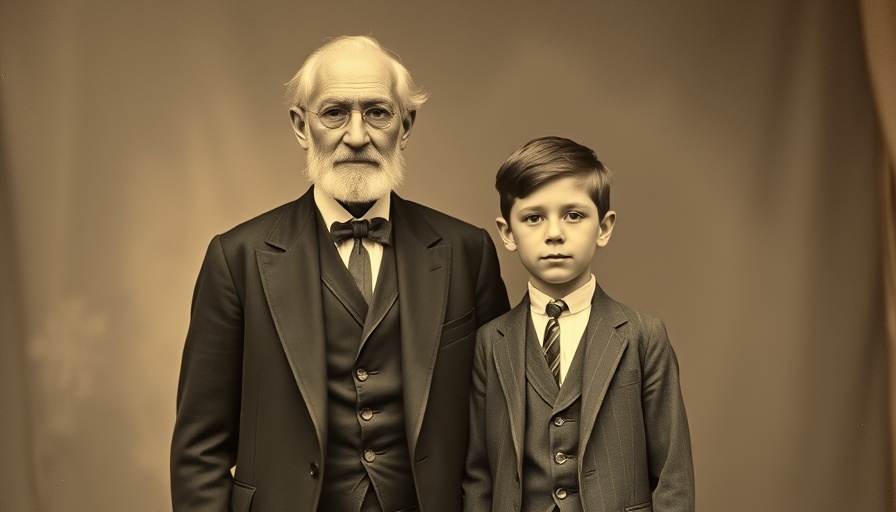
The Intersection of Science and Public Perception: Joseph Meister's Legacy
The story of Joseph Meister, a young boy who became the first human to be vaccinated against rabies by Louis Pasteur in the late 19th century, serves as a milestone in the battle against fear surrounding vaccinations. Despite the scaremongering narratives that often circulate in today’s health discussions, Meister’s experience emphasizes humanity’s reliance on scientific advancements to combat deadly diseases. Pasteur’s innovative approach to rabies showcased not only his brilliance but also the potential of vaccines to save lives, a narrative that echoes through the ages even as we face modern skepticism.
Societal Fear Versus Scientific Progress: Understanding Vaccine Hesitancy
In the present day, vaccine hesitancy remains a major issue, fueled by misinformation and fear. Similar to the initial public apprehension surrounding Pasteur’s methods, today’s vaccines face scrutiny. But it is essential to engage with these fears rather than dismiss them outright. Understanding that fear can stem from valid concerns, historical context, and personal experiences is crucial for building trust. An informed community, especially one as interconnected as the Seventh-day Adventist faith community, can turn to scientific evidence and public health data to address hesitancy effectively.
Religious Perspectives on Health Practices: An Adventist Approach
For the Seventh-day Adventist community, health and spirituality are deeply intertwined. Much of their health doctrine emphasizes natural living and holistic health practices, leading to unique perceptions about modern interventions like vaccines. The Bible promotes health and healing, and many members find that embracing scientific advancements aligns with their faith’s call to care for others. For instance, an emphasis on stewardship in the Adventist ideology can translate into a collective responsibility to prioritize vaccinations as a means of public health.
Historical Context: The Evolution of Vaccines and Public Health
Tracing the history of vaccines reveals a substantial transformation in how society perceives infectious diseases. The smallpox vaccine in the late 18th century paved the way for future vaccination programs globally. Understanding this background, the story of Pasteur and Meister becomes more than just a historical anecdote; it symbolizes the journey from fear towards acceptance through education and advocacy. Just as the smallpox vaccine eradicated a deadly disease, contemporary vaccines against measles, mumps, rubella, and COVID-19 represent modern triumphs in public health.
Contemporary Relevance: Why We Must Address Vaccine Misinformation
Today, misinformation spreads rapidly, which can deter vaccinations and lead to outbreaks of preventable diseases. Recent reports by health organizations highlight a troubling increase in vaccine-preventable diseases due to declining vaccination rates. For faith communities, this poses a pressing concern as they navigate public health messaging alongside their beliefs. Churches can play a critical role in disseminating accurate information, addressing concerns, and strengthening community ties by promoting health literacy.
Counterarguments: Understand the Other Side
While promoting vaccination, it is also crucial to address counterarguments presented by skeptics. Some individuals express concerns about vaccine safety based on personal experiences or anecdotal evidence. Addressing these arguments sensitively, alongside robust scientific evidence, is necessary for constructive dialogue. Highlighting success stories, such as the eradication of polio or the containment of measles, may help bridge the gap between skepticism and trust in vaccinations.
Actionable Insights: How to Navigate Discussions on Vaccination
Communities, especially within the Seventh-day Adventist church, can foster discussions around vaccines by sharing personal testimonials, organizing educational sessions, and partnering with health professionals. Establishing forums for open dialogue can demystify vaccines and create a supportive environment where members feel comfortable discussing their concerns. Practical approaches, such as providing facts alongside empathetic communication, can break down barriers and encourage vaccine acceptance.
Emphasizing the Value of Immunization: A Call to Action
As we reflect on the importance of vaccines from both historical and contemporary perspectives, it becomes clear that misinformation poses a significant threat to public health. By educating ourselves and others, promoting accurate information, and engaging in meaningful conversations, each member of the Seventh-day Adventist faith community can contribute to a healthier future. Remember, as stewards of our health and well-being, promoting vaccines is not only a personal choice but a collective responsibility.
 Add Row
Add Row  Add
Add 




Write A Comment